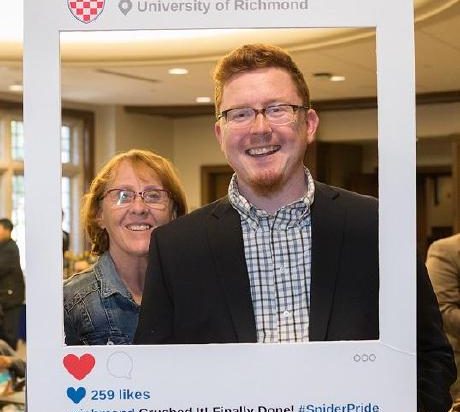Under Pressure: How a Natural Gas Mechanic Went from Just Paying the Bills to Building His Future

By all accounts, Patrick Lehmann had a good job. His work as a natural gas mechanic in the Virginia area was paying the bills—but that was about it.
“My typical day as a gas contractor was pretty much blue-collar stuff. I worked rough, 14-hour days, and on top of that, it usually took me an hour to get home from work every day,” Patrick said.
After five years, the tough manual labor and brutal schedule finally became too much. “I just wasn’t able to take care of myself. I didn’t have time to eat healthily or go to the gym,” Patrick said.
“That’s when I decided I needed to make a change.”
Anything you can do I can do better
Like many people, Patrick was nervous about a career change. He’d always been interested in learning to code, but the leap from gas meter mechanic to software developer seemed impossible. Luckily, Patrick had a few friends who’d successfully learned to code.
If they could do it, why not him?
“I always thought coding was for people that were way smarter than me,” Patrick said. “Then a few years ago, I watched some high school friends go through coding boot camps. Now they’re developers. I knew they were smart, but not geniuses. So I thought, ‘Why not give it a try?’”
Patrick discovered the University of Richmond Coding Boot Camp—and realized that boot camps were open to anyone, regardless of their background or experience level. The only thing standing between Patrick and his dream job in software development was a lot of hard work.
Breaking mountains into molehills
Patrick immediately took to the hands-on approach of the full-stack web development program, particularly the group projects. In fact, he credits the challenging coursework with reigniting his creative energy.
“The instructors made coming to class fun. I actually looked forward to completing each assignment,” Patrick said. “But the most important skill I took from the boot camp was learning how to learn. Technologies change so fast. It’s important to be able to pivot from one technology, library, or framework to another.”
Patrick’s life transformed almost overnight. Instead of working on the same old problems day in and day out, every day in the boot camp brought new challenges to solve.
“Our main focus was learning how to break large problems into smaller, solvable ones,” Patrick said, “That’s a huge part of why this kind of course works.”
Building his coding skills one line at a time gave Patrick the confidence he needed to tackle more advanced challenges.
“After I learned the fundamentals, I found myself getting heavily into JavaScript and working on the back end, which set me up for my current position as a software developer,” Patrick said. “The key is to not get bogged down by ‘analysis paralysis.’ You have to use the tools they give you in class to solve real-world problems.”
Real skills for the real world
“One of my favorite parts of the boot camp was the instructors and TAs,” Patrick said. “They were all knowledgeable and eager to help. But more than that, they all had actual experience working as developers.”
That kind of industry knowledge let Patrick’s instructors give him real feedback on what employers were looking for in the job market.
“They were always saying things like, ‘In the job market, X is important.’ That was a big deal for me, because I was 100% focused on getting out of working in natural gas and getting a coding job.”
From paying the bills to building his future
Just a few months after graduation, Patrick landed a job as a software developer for Homes.com, one of the country’s largest online real estate platforms—largely thanks to his new back-end development skills from the coding boot camp. In fact, many of the specific programs Patrick uses in his daily work are systems he learned in class.
“We learned Node.js in the boot camp, which is the system I work on today. So that was an easy transition that let me plug into the company in a meaningful way right off the bat,” Patrick said.
While Patrick loves the challenges of his new career, it’s the changes to other parts of his life that really matter.
“My overall quality of life has gotten significantly better since starting with Homes.com. They really value work/life balance, which I’m extremely grateful for. Now I’m able to cook my own meals and go to the gym regularly. They even have a wellness program which encourages these behaviors,” Patrick said. “Plus, I can walk to work every day. No more long commutes!”
Boot camp changed Patrick’s life, but he acknowledges the courses aren’t for everyone. They require plenty of hard work and dedication, so he has one piece of advice for anyone considering enrolling.
“Make sure coding is right for you,” he said. “This boot camp is an investment. Do some research before you sign up, because if you don’t really even know what coding is, it might not be for you.”
For those who do pursue their dream job, he has a final piece of advice.
“Stay passionate,” Patrick said. “Stay hungry, and work on side projects. The industry is all about side projects.”

 Live Chat
Live Chat